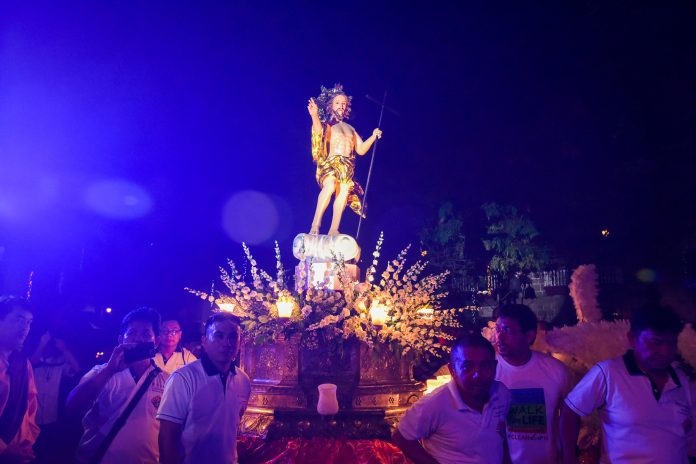Reflection for the 32nd Sunday in Ordinary Time (Cycle C)
“For God is God of the living, and not of the dead, for to him everyone is alive.”
With these enigmatic words, our Lord proclaims in a way, that death seems to be only an abstraction, a “non-reality” affirming the eternalness of the immateriality of created spirits. In other words, death does not mean the loss of the spirit, only the disintegration of the body constituted by it during conception; it is an instantaneous and existential event pointing to the entropy and finiteness of any and all material manifestations.
Though we may be consoled with this thought about the perpetuity of souls, the “sting of death” which we will all unavoidably encounter, lies in the inevitable distress and pain over the body’s disintegration; hence, death is also an event in which anxiety impels us to know and reflect more deeply about the meaningful truths and purposes towards which our souls may responsibly direct our bodies for complete understanding and fulfillment. Such “completeness” has become the normative yet often elusive goal of this bodily phase of the soul’s actuality; anxiety persistently emanates from the thought of a possible “incompleteness” upon bodily disintegration.
Moreover, this same notion of the souls’ perpetuity consequently implies the “resurrection life,” when eternal immateriality actually transitions from one phase to another, from a phase “clothed with a body” to a phase “unclothed in all its authenticity.”
“Resurrection” therefore becomes a mere category, in order for finite materiality to comprehend its inexplicable transfiguration after bodily disintegration, in reversion to naked eternal immateriality; the term “resurrection” attempts to explain this transfiguration, appropriating the image of a “rising again” from the remains of an ended materiality. Hence, resurrection is an event in which hope impels us to overcome “incompleteness” by striving to achieve “completeness” upon bodily disintegration.
So, a reflexive comprehension of both the anxiety towards death and the hope of the resurrection contributes primarily to the correction of our disordered self-centeredness, and to the sustainment of genuine selflessness. It significantly triggers our service for God’s kingdom of justice and peace, in which we can boldly declare upon ultimate oblation: “We are prepared to die right now rather than break the law of our ancestors.” “You now dismiss us from life, but the king of the world will raise us up. He will give us eternal life since we die for his laws.” “I have received these limbs from God, but for love of his laws I now consider them as nothing. For I hope to recover them from God.” “I would rather die at the hands of mortals, and wait for the promises of God who will raise us up.”
However, our Lord emphasizes that the systems and processes with which we constitute and are constituted by materiality, and with which our souls may responsibly direct our bodies towards meaningful truths and purposes in that materiality, do not extend into immateriality. Socio-cultural and political constructs such as laws, norms, practices, institutions and organizations as well as the positions, power, prestige and possessions that are established by and for these constructs, are intended only for the use in materiality, and are thus useless in immateriality.
The marks or categories of materiality – rich or poor, powerful or powerless, famous or unknown, western or eastern, intelligent or ignorant, “deserving” or “undeserving,” churched or unchurched, “ministering” or “being ministered to” – are consequently, not indelible, except for the marks which the Spirit mysteriously and graciously bestows upon souls, for whatever divine ends it may have in heavenly infinity. “Taking a husband or a wife is proper to people of this world, but for those who are considered worthy of the world to come, and of resurrection from the dead, there is no more marriage. Besides, they cannot die, for they are like the angels. They are sons and daughters of God, because they are born of the resurrection.” What matters more is what we can accomplish for a supernaturally assured and permanent immateriality; and not for a needlessly prolonged yet impermanent materiality.
Let us remember what St. Francis admonishes, “… for what a man is before God, that he is and nothing more.”
May we pray for each other, “May Christ Jesus, our Lord, who has loved us, may God our Father, who, in his mercy, gives us everlasting comfort and true hope, strengthen you. May he encourage your hearts and make you steadfast in every good work and word. May God guard us from wicked and evil people, since not everyone has faith. May the Lord direct your hearts to the love of God and to the steadfastness of Christ.”
Let us be children of both death and resurrection; and “like the angels”, believers in the impermanence of materiality and the permanence of immateriality, totally absorbed only in dwelling with the God of forever!
Brother Jess Matias is a professed brother of the Secular Franciscan Order. He serves as minister of the St. Pio of Pietrelcina Fraternity at St. Francis of Assisi Parish in Mandaluyong City, coordinator of the Padre Pio Prayer Groups of the Capuchins in the Philippines and prison counselor and catechist for the Bureau of Jail Management and Penology.
The views expressed in this article are the opinions of the author and do not necessarily reflect the editorial stance of LiCAS.news.









